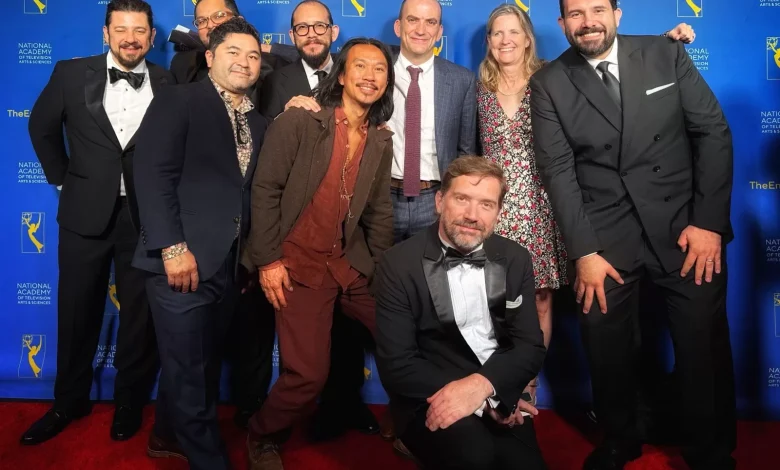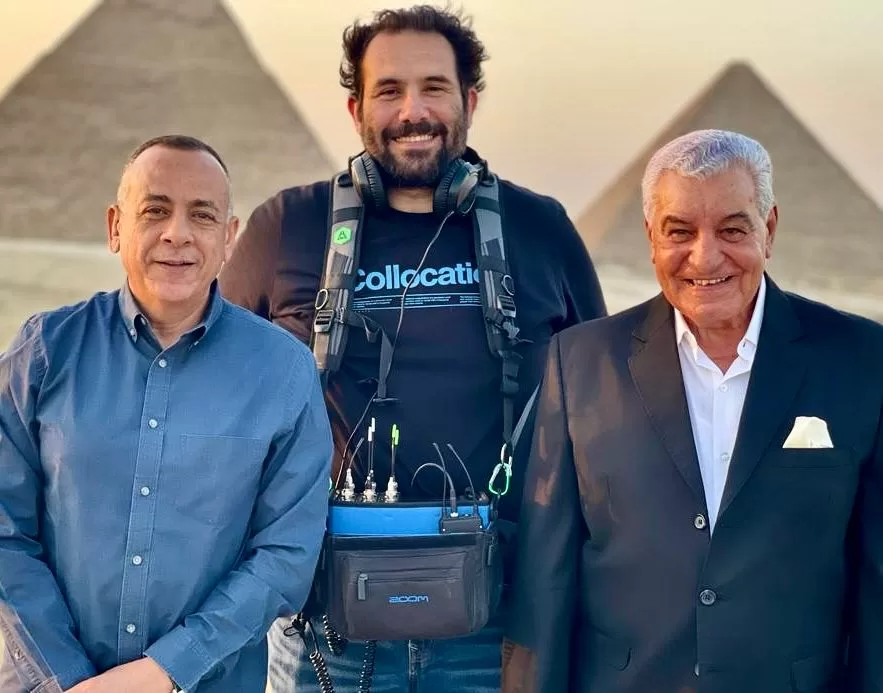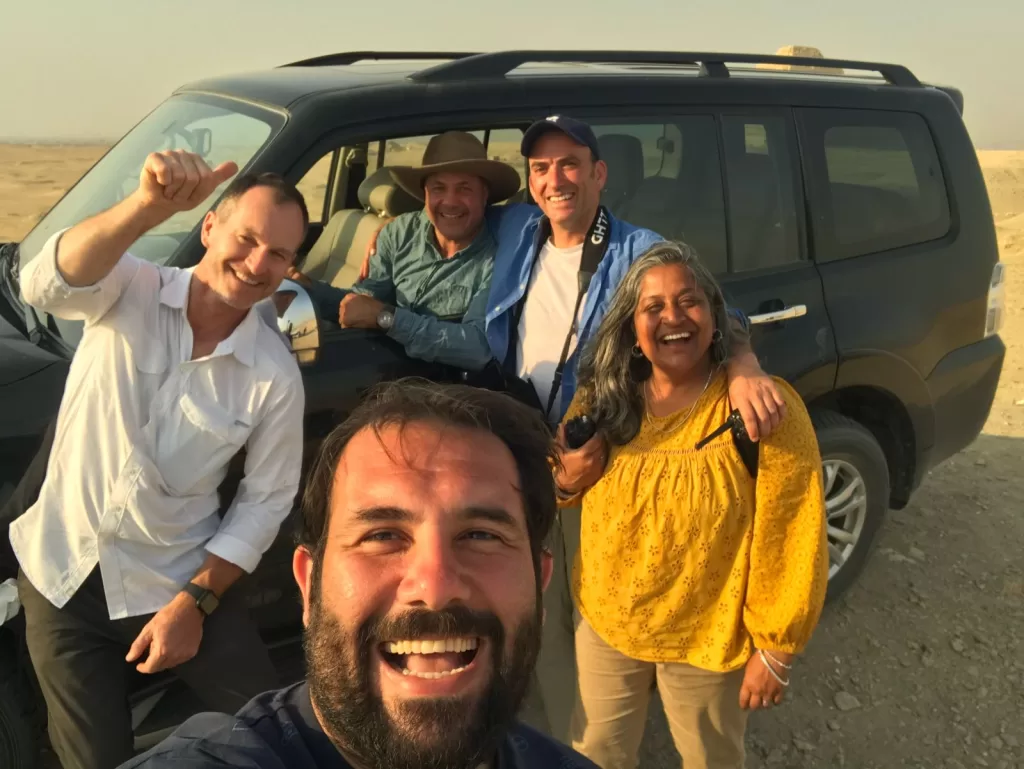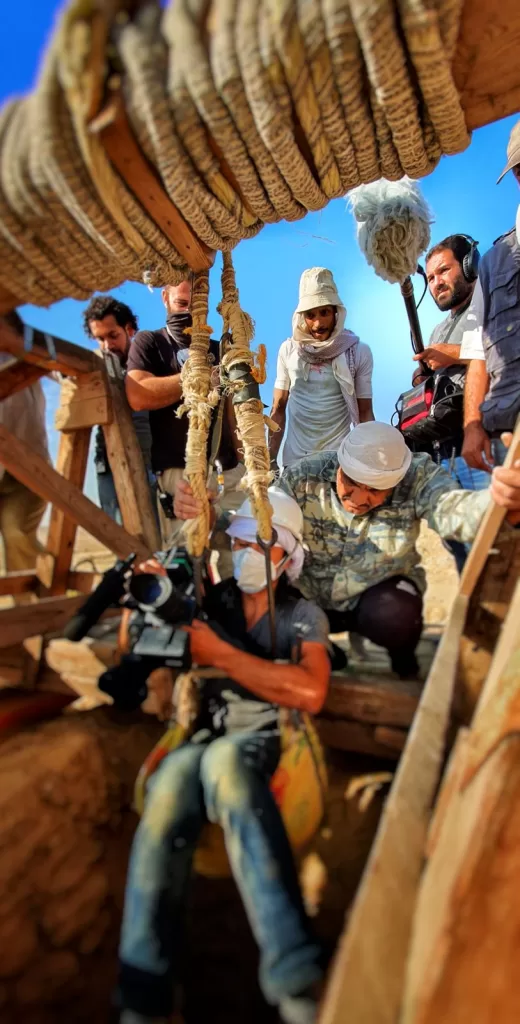Netflix’s ‘Unknown: The Lost Pyramid’ celebrates historic Emmy nominations, spotlighting Egyptian talent

The documentary film “Unknown: The Lost Pyramid” has achieved a notable milestone by earning two acclaimed Emmy nominations in the categories of Cinematography and Sound. This prestigious acknowledgement underscores the extraordinary talent and commitment of the entire production team, whose shared enthusiasm brought this fascinating journey into ancient enigmas to life.
In a historic first, the documentary’s sound team, composed of Egyptian sound recordists, achieved an Emmy nomination, marking a proud moment for both the film and their country. Their innovative efforts represent a new benchmark in the industry, proving that talent transcends borders.
Premiered by Netflix on July 3, 2023, the film features esteemed Egyptologists Dr Zahi Hawass and Dr Mostafa Waziry. Set in Saqqara, the latest archaeological hotspot in Egypt, it chronicles Dr. Hawass’s search for a lost pyramid of an ancient Egyptian king and Dr Waziry’s quest for an untouched tomb. The documentary captures their urgent mission to uncover groundbreaking discoveries.
Directed by Max Salomon, an Emmy award-winning filmmaker, this production reflects his expertise in crafting compelling documentaries for both Netflix and National Geographic.
The Egyptian Gazette interviewed Mohamed Ibrahim Taha, the lead sound recordist who represented Egypt at the Emmy Awards in the United States.
How does it feel to achieve such iconic recognition at the Emmys, especially for the sound team as the first Egyptian nominees in their category?
It’s amazing! You work hard in the desert thinking, “I hope this makes it to the final cut,” and the next thing you know, you’re standing on the red carpet in America, nominated for an Emmy! It’s a huge honour to be there, especially as the first Egyptian nominees in this category, both for me as the lead sound recordist and my colleague Mohamed Hassan, who worked as an additional sound recordist on the film. It’s a significant step forward for Egyptian sound professionals in the film industry. And not only us—there were dozens of Egyptian crew members and technicians working on every aspect of this international production, every day alongside the foreign crew.

What unique challenges did the Cinematography and Sound teams face while working on the documentary “Unknown: The Lost Pyramid,” and how did they overcome them?
The main challenge was capturing the magnitude of discoveries in the intense heat and unpredictable conditions of Saqqara. Recording sound in the middle of the desert was no easy task! With the heat, sandstorms, constant outdoor conditions, and the extreme depth of the shafts that negatively affected the quality of the microphone signal (sometimes from 12 metres deep underground), capturing clean audio was a challenge. As the sound recordist, I had to stay on my toes, ensuring every moment was captured without interference, and I created some DIY devices that helped improve the signal and made my work easier for the team and me, despite battling winds that seemed to have their own agenda. The Cinematography team also had to navigate tricky lighting, working quickly to capture shots without disturbing the delicate excavation process. But with a crew as passionate as ours, we found ways to adapt and improvise—always with history unfolding before us!

Can you share a particularly memorable moment from the filming process that stands out to you or the team?
There were many unforgettable moments—when Dr. Hawass or Dr. Waziry’s teams discovered those unlooted tombs and all the treasures that you see in this film. Each time, the atmosphere was electric! I was there, recording the reactions as they unfolded, and the excitement was incredible. The sounds of discovery—people gasping, tools scraping the earth—are not something you can recreate in a studio or repeat the way you do in a fiction film. Each of these is a rare, unforgettable, real moment.
What message do you hope audiences take away from “Unknown: The Lost Pyramid” after watching it?
The message is clear: Egypt is still revealing its secrets, and we’ve only scratched the surface. I hope viewers feel inspired not only by the richness of our history but also by the dedication of a new generation of modern Egyptian archaeologists like Dr. Hawass, Dr. Waziry, and their entirely Egyptian scientific teams. The film shows how each new discovery brings us—as Egyptians—closer to understanding our own ancestors. It is one of the rare international films that showcases Egyptians telling their own story. I hope that not only the sense of wonder but also the inspiration and pride stay with audiences long after the credits roll.

Could you share some insights into the collaborative process between the different teams that worked on the film?
The collaboration on set was a beautiful dance between sound, cinematography, and archaeology. I worked closely with both the excavation teams and camera crews to ensure that the audio captured the real-time excitement of each find. Dr Hawass, Dr Waziry, and their teams played a pivotal role in guiding us through these moments, not only keeping us safe but also making it possible to capture this delicate yet dangerous environment and ensuring that we understood the importance of each discovery. Working under the leadership of director Salomon was very interesting, as he is able to turn any challenge into an adventure on the screen. I still remember when he entered the tent and said, “There is a sandstorm coming that prevents us from filming, so we will film in the sandstorm!” We felt that at every step of filming, we were doing something that no one had done before us. All of this was happening under the supervision of the production team led by Priya Ramasubban, who worked tirelessly to overcome all the obstacles that might prevent us from filming while providing all the means of comfort for the team with her usual calm and smile. We were all—Egyptians and internationals side by side—helping each other, which made the project a true team effort.
What has been the impact of this nomination on Egyptian representation in the film industry, both locally and internationally?
This nomination is a significant win for Egypt! It demonstrates that we can not only participate but also lead in global storytelling, especially in key technical fields like sound. Locally, it inspires filmmakers and sound professionals to dream bigger. Internationally, it puts Egypt on the map in a new way — not just for the pyramids, but for world-class filmmaking!
Are there any behind-the-scenes stories that highlight the dedication and passion of the crew involved?
Oh, absolutely! One day, we were racing against the sun to finish a shot when suddenly everything became chaotic. A massive sandstorm ripped into the set. Equipment was flying around, and people were running. Usually, production stops when this kind of disaster happens. But our director, Salomon, wanted to keep filming. I had to quickly adjust the sound setup to make sure we didn’t miss anything. It’s a challenge to record dialogue in the howling roar of the wind in the middle of a powerful Khamsin! But suddenly, you could feel the harmony between the team, like an orchestra led by Max, the maestro. Everyone’s dedication was incredible—even amidst the madness, we pulled it off! It is now one of the most memorable sequences in the finished film.
There was another day when we were filming, and the sky turned grey as it began to rain heavily. This was an important moment to show the resilience of the excavation workers in these harsh conditions, as the sand turned into mud due to the rain. We were all excited to document that situation and immersed ourselves in it until we finally discovered that we were too wet and covered in mud as if we had just emerged from a swamp.
What’s next for the team following this success?
For those of us on the production side, we hope to continue blending storytelling with sound to bring more untold stories to life. The Emmy nomination is just the beginning. A new era of international collaboration in this industry is emerging, where we as Egyptians are not just supporting foreign teams but are partners as equals in key positions that historically only foreigners used to fill.

